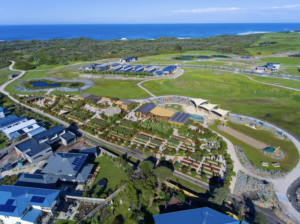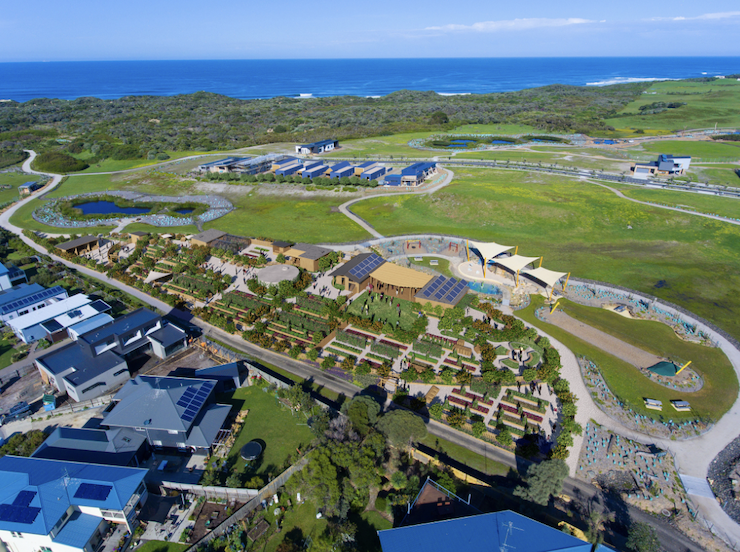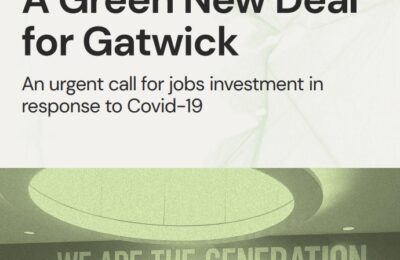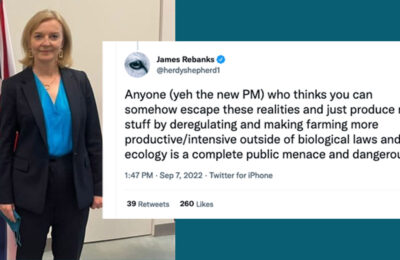From billmitchell.org
 I read an interesting report in the last few days – The Economics of the Food System Transformation – published on January 29, 2024 by the – Food Systems Economics Commission (FSEC) – which “is a joint initiative that brings together 21 commissioners from 19 global institutions”. The topic is very relevant to research I am engaged in at present as part of my upcoming book release on Degrowth and Capitalism. It is also relevant to my lived experience which I will briefly touch on.
I read an interesting report in the last few days – The Economics of the Food System Transformation – published on January 29, 2024 by the – Food Systems Economics Commission (FSEC) – which “is a joint initiative that brings together 21 commissioners from 19 global institutions”. The topic is very relevant to research I am engaged in at present as part of my upcoming book release on Degrowth and Capitalism. It is also relevant to my lived experience which I will briefly touch on.
As I read the Report from the FSEC I was reminded of the early contribution of Austrian-French intellectual – André Gorz – who I had spent many hours reading when I was a postgraduate student.
André Gorz wrote extensively about the industrial nature of Capitalism and how it was shaped by the conflicting class ambitions of labour and capital.
He supported worker self-management and was occupied by developing practical strategies for workers to assert control over their workplaces.
That work was the context in which I used his ideas in my own early work on labour processes etc.
However, in the early 1970s, following the release in 1972 of the – Club of Rome – Report – The Limits to Growth – André Gorz also made valuable contributions which I consider should define the way forward for progressives.
The Club of Rome’s study concluded that resource limits ultimately curtail the capacity of the economic system to grow.
I was too young to really appreciate what was going on at the time in the ecological space and our youth was devoted to the anti-war movement and struggles against colonial imperialism and the battles with Marxism between the continental structuralists who had embraced post modernism and those that preferred a more nuanced Marxist framework, such as the existential Marxism of Jean-Paul Satre.
So, while I had a copy of ‘The Limits to Growth’ not long after it was published, it didn’t occupy a central place in my mind.
But I was aware of the views of André Gorz on the topic, which were seminal in the emergence of the so-called ‘décroissance’ (degrowth) literature.
André Gorz introduced the term ‘décroissance’ during a debate that was published in 1972 by his magazine Le Nouvel Observateur.
What separated his ideas from those in The Limits to Growth, was that he placed the ecological challenge squarely in the context of the viability of the capitalist system of accumulation.
I will write much more about how this perception provides progressives with an alluring alternative to the Green New Deal narrative that dominates most progressive activism on the topic of climate change.
The Degrowth movement, as it reflects the lineage from André Gorz’s décroissance, is
The Green New Deal (GND) movement is more aligned with the ‘sustainable development’ approach that emerged with the publication of the Brundtland Report in 1987, which maintained that economic growth could continue with approach regulative controls.
In other words, these movements are not part of a critique of the viability (or desirability) of capitalism and market allocation via profit incentives.
I clearly reject the concept of sustainable development and the allied GND.
In 1972, André Gorz wrote:
Is global equilibrium compatible with the capitalist economy, given that the material resources on our planet are not endless?
He thus directed the Limits ideas into a more substantial critique of the very production form under capitalism and in doing so establihed a lineage that persists today in the degrowth thinking.
I will have much more to write on those topics in the weeks ahead as I bring all my ideas together on the topic.
But André Gorz also wrote in his 1972 article that:
L’économie de profit doit être remplacée par une économie décentralisée et distributive. Ce n’est que dans les communautés intégrées, « à l’échelle humaine », que l’ajustement de la production aux besoins et des besoins aux ressources – ainsi que le souci de ménager et de soigner l’environnement – peuvent reposer sur des décisions collectives plutôt que sur des contraintes bureaucratiques et policières. L’activité libre, l’autodétermination des producteurs associés à l’échelle des communes et des régions l’emporte sur le travail salarié et les rapports marchands. En fin de compte les écologistes apportent une caution scientifique à tous ceux qui ressentent l’ordre présent comme un désordre barbare et le rejettent.
This appeal to human agency (and existentialism) within his Marxism rehearses the way in which the ideas of John-Paul Sartre had also evolved as his work became more political and less literary over the course of his life.
In this passage, André Gorz rejects the ‘profit economy’ and advocates the evolution to a ‘a decentralized and distributive economy’ where ‘integrated communities at a human scale’ produce for need and protect the environment.
Where decisions are taken by collectives rather than authoritarian bureaucracies.
He was thus an early advocate of localism and the degrowth strategy will require highly decentralised mechanisms for producing and distributing food, which brings me to the Report I cited at the outset.
The Report writes that:
… the recent evolution of food systems has fuelled – and continues to inflame – some of the greatest and gravest challenges facing humanity, notably persistent hunger, undernutrition, the obesity epidemic, loss of biodiversity, environmental damage and climate change. The economic value of this human suffering and planetary harm is well above 10 trillion USD a year, more than food systems contribute to global GDP. In short, our food systems are destroying more value than they create.
They note that discussions around food production and food security are often ignored or downplayed in proposals to deal with climate change.
Importantly, the Report argues that “transforming food systems worldwide” into “an inclusive, health-enhancing and environmentally sustainable global food system” would deliver massive benefits in the form of better health outcomes and reduction in climate damage.
They estimate that such a transformation would deliver benefits “worth 5 to 10 trillion USD a year, equivalent to between 4 and 8 percent of global GDP in 2020”.
They acknowledge that:
… negotiating change across a multitude of diverse stakeholders with unequal power and varying prospects from the transformation is an enormous challenge
But, on the positive side:
Evidence shows that embracing equity and inclusion is key to making a transformation politically viable and thus essential for success.
So you will be getting the drift I think.
You will find the word ‘profit’ is mentioned only twice in the 117-page report.
In one instance, they write that “The power of corporations and the nature of institutions are often intertwined” but that “Despite the concentrated nature of power in food systems, a growing number of diverse interests are emerging.”
They claim that it is possible to engage “stakeholders” to allow for such a transformation to take place.
This includes the promotion of “green business entrepreneurs” and identifying “new business opportunities … can shift perceptions of the innovations among interests vested in the status quo”.
Policies advocated all seem to be designed to change incentives as a result of market shifts driven by subsidies and taxes.
I consider this a major flaw and is consistent with the dominant progressive themes that climate initiatives can be achieved through market mechanisms – manipulating the price of carbon-intensive products and subsidising desirable production.
In general, progressives seems to have been lured into this ‘market-style’ thinking. Everything has to be moderated through the price mechanism. This is a neoliberal framing.
Markets are constantly being corrupted by the wealthy and ‘rigged’ in their favour.
A non-neoliberal framing is to reject the market logic and use the regulative and the legislative capacity of the state to make illegal activities and functions that we deem to be unnecessary to the well-being of the people and which may potentially undermine our prosperity.
This is also my perspective on eliminating carbon-intensive industries – better to regulate them out of existence than try to play smart with carbon taxes or trading schemes.
I will come back to that idea presently.
The Report also notes that “The global increase in meat consumption is incompatible with both the 1.5°C climate target and the land targets agreed upon in the 2023 Kunming-Montreal Convention on Biodiversity”, and clearly support major dietary changes.
However, they do not advocate the promotion of vegetarianism or veganism, rather believing that the market will shift diets as taxes are placed on climate-damaging meat products.
The authors are thus firmly in the ‘reform capitalism’ camp and believe that such reforms to the price allocation system will do the trick.
The same sort of hope is to be found in those that want to reform the European Union, despite the neoliberalism being embedded in the very legal structure (the Treaties) of the EU, which are virtually impossible to change.
I reject the reform approach if the core of the problem is rotten.
In that sense, I am in the André Gorz camp – that “L’économie de profit doit être remplacée par une économie décentralisée et distributive”.
The root of the problem, which underpins the market system, is that private profit is privileged in our resource allocation decision making.
In other words, I do not think we can achieve a wholesale transformation of food production and distribution within the power structures of capitalism.
And echoing André Gorz, I think the future is cooperatives operating on a local scale in both production and distribution.
As a final reflection, I am part of an experimental development on the coast of Victoria, Australia, which has turned a degraded dairy farm into what is called “Australia’s most sustainable housing estate”.
A typical developer would place 950 odd houses on the land purchased, filling it up with roofs and concrete, but our estate will only allow around 220 houses, with more than 50 per cent of the land devoted to restoring water systems, flora and providing safe environments for local fauna.
All the houses are passive and must reach high energy efficiency requirements.
It is a marvellous experiement and one of its features at the eastern end of the estate is a large, cooperatively-owned community farm.
This picture of the farm is as it was in the early stages.
It is now fully functional and provides food security for the residents and donates a lot of food to various needs in the local area (hospitals, aged care homes, schools, etc).
It is fully organic and massively productive.
The farm community members have individual plots and there are other plots that are farmed by a farmer that we employ – boosting productivity and continuity of supply.
The farm satisfies the requirements set out by André Gorz in 1972 for food production to be local, cooperative and based on need rather than profit, while also protecting the environment.
In my view, every housing development that is approved should be required to have similar food production capacity.
Conclusion
The FSEC Report in my view is in a long line of progressive inputs that think reforming the capitalist system is the way to go while leaving the essential characteristics – profit seeking, response to market incentives etc – in place.
I agree with André Gorz, that a degrowth paradigm is incompatible with the ongoing nature of capitalism and that we should be pursuing initiatives that undermine that mode of production.
That is enough for today!
(c) Copyright 2024 William Mitchell. All Rights Reserved.




